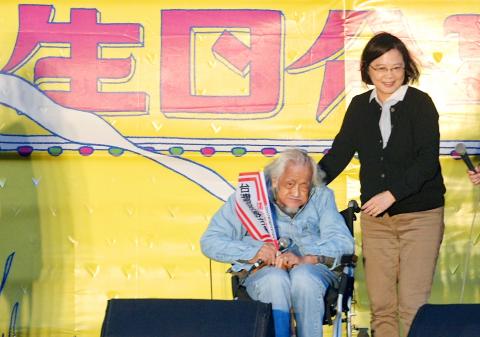Presidential Office adviser and long-time independence advocate Su Beng (史明) late on Thursday evening expressed on Facebook his support for President Tsai Ing-wen (蔡英文) to seek re-election next year.
The move came after Presidential Office adviser Wu Li-pei (吳澧培), former Presidential Office adviser Peng Ming-min (彭明敏), former Academia Sinica president Lee Yuan-tseh (李遠哲) and the Reverend Kao Chun-ming (高俊明) in an open letter on Thursday urged Tsai not to seek re-election.
Su, 101, urged people to support Tsai in the presidential election next year, as “otherwise, it would not only be Tsai’s personal failure, but also the failure of Su Beng and the pro-independence movement.”

Photo: Chang Chia-ming, Taipei Times
The “one country, two systems” scheme Beijing tried to force upon the nation on Wednesday was a “colonial” policy, Su said.
“The Taiwanese independence movement is 99.9 percent complete. The last fight is in the remaining 0.1 percent,” said Su, also known as the “pro-independence grandpa.”
“Taiwan is where we were born and where we live. [Only] Taiwanese are the masters of Taiwan,” he said.
In the “last fight,” Taiwan must abide by its principles: promote nationalism and defeat colonialism; follow policies to move Taiwanese independence from an “ideal” to a “reality”; and engage in spiritual pursuits to become better people, which has to do with liberation, he said.
The three principles are themselves forms of spiritual pursuits Taiwanese should engage in, he added.
The post drew a response from Tsai, who yesterday morning replied: “Thank you so much, grandpa. Please take care.”
Su is the author of Taiwan’s 400-Year History (台灣人四百年史).
Separately yesterday, Overseas Taiwanese for Democracy, a group of Taiwanese studying or working overseas, also issued a statement in support of Tsai.
Taiwan is at a crossroads never before seen in history and many are at a loss as to the way forward, the statement said.
“What Taiwan needs now is strength from the unity of all its people coming together to make their own path,” the statement said. “Under the leadership of a president who is resolute, composed, flexible and yet tough, [Taiwan will] gradually bring reform to internal affairs, broaden diplomatic space and strive toward the future.”
Tough at times and moderate when needed, Tsai has exercised flexibility in her governance, it said.
“A good leader needs these qualities to help Taiwan sail through the storm and the tumultuous times it is having both domestically and internationally,” it said. “We openly support President Tsai and her administration, as well as the efforts they have made to achieve reform goals, including marriage equality, labor rights, pension reforms and transitional justice.”

ACTION PLAN: Taiwan would expand procurement from the US and encourage more companies to invest in the US to deepen bilateral cooperation, Lai said The government would not impose reciprocal tariffs in retaliation against US levies, President William Lai (賴清德) said yesterday, as he announced five strategies to address the issue, including pledging to increase Taiwanese companies’ investments in the US. Lai has in the past few days met with administrative and national security officials, as well as representatives from various industries, to explore countermeasures after US President Donald Trump on Wednesday last week announced a 32 percent duty on Taiwanese imports. In a video released yesterday evening, Lai said that Taiwan would not retaliate against the US with higher tariffs and Taiwanese companies’ commitments to

‘SPECIAL CHANNEL’: Taipei’s most important tasks are to stabilize industries affected by Trump’s trade tariffs and keep negotiations with Washington open, a source said National Security Council Secretary-General Joseph Wu (吳釗燮) arrived in the US for talks with US President Donald Trump’s administration, a source familiar with the matter said on Friday. Wu was leading a delegation for a meeting known as the “special channel,” the Financial Times reported earlier. It marked Trump’s first use of the channel since returning to the White House on Jan. 20. Citing a source familiar with the matter, the Financial Times reported that Minister of Foreign Affairs Lin Chia-lung (林佳龍) was also a part of the delegation. The visit came days after China concluded war games around Taiwan and amid Trump’s

CHIP EXCEPTION: An official said that an exception for Taiwanese semiconductors would have a limited effect, as most are packaged in third nations before being sold The Executive Yuan yesterday decried US President Donald Trump’s 32 percent tariff on Taiwanese goods announced hours earlier as “unfair,” saying it would lodge a representation with Washington. The Cabinet in a statement described the pledged US tariffs, expected to take effect on Wednesday next week, as “deeply unreasonable” and “highly regrettable.” Cabinet spokeswoman Michelle Lee (李慧芝) said that the government would “lodge a solemn representation” with the US Trade Representative and continue negotiating with Washington to “ensure the interests of our nation and industries.” Trump at a news conference in Washington on Wednesday announced a 10 percent baseline tariff on most goods

Intelligence agents have recorded 510,000 instances of “controversial information” being spread online by the Chinese Communist Party (CCP) so far this year, the National Security Bureau (NSB) said in a report yesterday, as it warned of artificial intelligence (AI) being employed to generate destabilizing misinformation. The bureau submitted a written report to the Legislative Yuan in preparation for National Security Bureau Director-General Tsai Ming-yen’s (蔡明彥) appearance before the Foreign Affairs and National Defense Committee today. The CCP has been using cognitive warfare to divide Taiwanese society by commenting on controversial issues such as Taiwan Semiconductor Manufacturing Co’s (TSMC, 台積電) investments in the